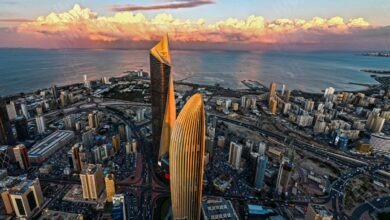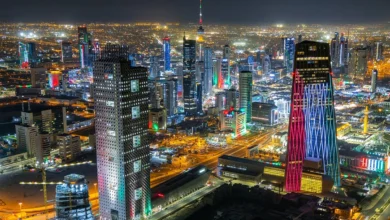Kuwait ranks fourth in Gulf with highest industrial land rental costs
In Kuwait, the industrial sector is pivotal and serves as a significant economic pillar, offering diversification of the country’s income sources.

-
Kuwait’s industrial sector adds substantial value to the national economy, accounting for approximately 7.4 percent of the total workforce, with over 214.3 thousand workers as of the end of 2023.
-
Talal Al-Ajeel, the CEO of the National Ceramic Industries Company, calls for giving priority to the local product in government tenders to encourage industrialists to continue their work and to foster the growth of the industry.
-
Imran Hayat, the former Chairman of the Board of Directors of NAPESCO, emphasized that investing in infrastructure in Kuwait is crucial for advancing economic initiatives and ensuring their implementation, while also facilitating opportunities for local and foreign capital to invest in Kuwait.
In light of significant transformations in the business sector and infrastructure, along with innovative policies to diversify regional economies, Gulf countries are striving to reduce dependence on oil revenues as their primary budgetary income.
The countries are competing to offer facilities and incentives to develop their industrial sectors, crucial for economic diversification and absorbing a large number of workers and university graduates, according to the Al Rai newspaper.
The six Gulf countries have taken varying steps to amend industrial land fees to stimulate industries and increase their contribution to the gross domestic product (GDP).
In Kuwait, the industrial sector is pivotal and serves as a significant economic pillar, offering diversification of the country’s income sources. It adds substantial value to the national economy, accounting for approximately 7.4 percent of the total workforce, with over 214.3 thousand workers as of the end of 2023, according to statistics.
According to statistics from Al Rai newspaper, Kuwait ranked fourth in the Gulf for the highest rental price per square meter for industrial lands, at three dinars.
Dubai had the highest rental prices among Gulf countries, at KD 14.68 dinars per square meter (AED 176), followed by Bahrain at KD 7.34 dinars (Nine Bahraini dinars), and Oman at KD 5.58 dinars (Seven Omani riyals).
In contrast, the rental value per square meter in Saudi Arabia was the lowest in the Gulf at 410 fils (5 Saudi riyals), followed by Abu Dhabi at 420 fils per square meter. Qatar also reduced its rental prices this week to 840 fils (10 Qatari riyals).
Industrial sector key component for any country: Hussein Al-Kharafi
Hussein Al-Kharafi, the Chairman of the Federation of Industries, praised Qatar’s recent decision to reduce annual rental fees for various types of plots, especially industrial ones, by percentages ranging between 50 and 90 percent. He noted that this move will stimulate development and sustainability, increase employment rates, boost the economy, and enhance the competitiveness of local products.
He pointed out that the industrial sector is a crucial component for any country, as it has the ability to boost economic size and exports, strengthen the budget, diversify income sources, and importantly, enhance social security by employing national labor, thereby reducing the burden on the government.
Al-Kharafi explained that while increasing rents on various types of plots may increase state revenues, it could potentially lead to the loss of billions of dinars and thousands of jobs that factories and producers could otherwise contribute to the national economy.
He stressed the need for the state to support the industrial sector as one of the strategic sectors, expressing his hope that the new government would prioritize industry and local products.
Scarcity of residential lands
In turn, Imran Hayat, the former Chairman of the Board of Directors of the National Petroleum Services Company (NAPESCO) and member of the Board of Directors of the Financial Center, said, “The problem of not providing suitable lands with infrastructure in Kuwait is one of the most prominent challenges facing all economic sectors. We suffer from a scarcity of residential, investment, and storage lands, not just industrial lands.”
Hayat stressed that the most important measure to stimulate economic sectors, including the industrial sector, is urgently resolving the issue of land scarcity and offering it at reasonable prices, which would attract investments to vital economic sectors.
He added that the government currently holds the main levers of the economy and must take effective steps to activate and energize it by launching projects and providing land and infrastructure.
Hayat emphasized that investing in infrastructure in Kuwait is crucial for advancing economic initiatives and ensuring their implementation, while also facilitating opportunities for local and foreign capital to invest in the country.
He explained that the state’s investment in building a distinguished infrastructure and creating opportunities across all sectors for Kuwaiti and foreign investors will drive the economy.
He also highlighted investment opportunities in the construction and development sector, emphasizing the importance of launching major projects, notably the development of the northern region and the establishment of Silk City, to achieve a comprehensive economic renaissance.
Hayat pointed out the necessity of supporting other industrial and petroleum projects and involving the private sector in them to increase competitiveness. Additionally, he emphasized the importance of supporting Kuwait’s transformation into a hub for goods and services transit to and from neighboring countries, as well as providing storage lands to establish Kuwait as a logistical center in the region.
Prioritizing local product
Talal Al-Ajeel, the CEO of the National Ceramic Industries Company, said that Kuwait is not considered an industrial country due to the lack of primary materials. Therefore, establishing any industry there requires importing all materials from abroad and providing extensive storage spaces.
Al-Ajeel added that the most important incentives for establishing industry in Kuwait are the annual rent of industrial land and the appropriate electricity tariff. Without these, many medium and heavy industries that require large spaces for storage or operational activities would find the endeavor unprofitable.
While stressing the need for the state to support this vital sector by all means, Al-Ajeel called for giving priority to the local product in government tenders to encourage industrialists to continue their work and to foster the growth of the industry.
Essential catalysts revealed for industrial growth
Al-Kharafi stressed that there are many incentives needed by the industrial sector in Kuwait, most notably:
- The government’s recognition and understanding of the industrial sector’s importance to the national economy and social security.
- Prioritizing local products in government procurement and implementing reciprocity policies, similar to other Gulf countries.
- Accelerating government efforts to establish industrial zones, particularly the ‘Naeem Zone,’ to provide a maximum number of industrial plots.
- Establishing appropriate pricing for industrial and storage units that are affordable for industrialists to complete their projects.
- Actively promoting public-private partnership projects.













